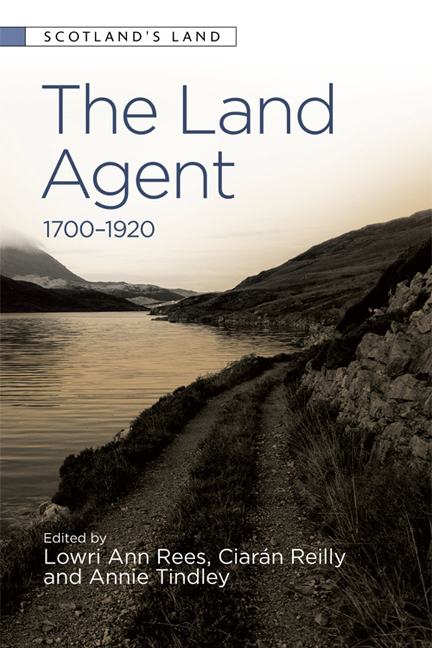Book contents
- Frontmatter
- Contents
- List of Figures
- Acknowledgements
- Notes on the Contributors
- Map of the British and Irish Isles
- Introduction
- Part I Power and its Constructions on Landed Estates
- Part II The Transnational Land Agent: Managing Land in the Four Nations and Beyond
- 4 Divisions of Labour: Inter-managerial Conflict among the Wentworth-Fitzwilliam Agents
- 5 The Courtown Land Agents and Transnational Estate Management, 1850–1900
- 6 Peter Fairbairn: Highland Factor and Caribbean Plantation Manager, 1792–1822
- Part III Challenges and Catastrophe: The Land Agent under Fire
- Part IV Social Memory and the Land Agent
- Postscript
- Index
4 - Divisions of Labour: Inter-managerial Conflict among the Wentworth-Fitzwilliam Agents
from Part II - The Transnational Land Agent: Managing Land in the Four Nations and Beyond
Published online by Cambridge University Press: 11 August 2018
- Frontmatter
- Contents
- List of Figures
- Acknowledgements
- Notes on the Contributors
- Map of the British and Irish Isles
- Introduction
- Part I Power and its Constructions on Landed Estates
- Part II The Transnational Land Agent: Managing Land in the Four Nations and Beyond
- 4 Divisions of Labour: Inter-managerial Conflict among the Wentworth-Fitzwilliam Agents
- 5 The Courtown Land Agents and Transnational Estate Management, 1850–1900
- 6 Peter Fairbairn: Highland Factor and Caribbean Plantation Manager, 1792–1822
- Part III Challenges and Catastrophe: The Land Agent under Fire
- Part IV Social Memory and the Land Agent
- Postscript
- Index
Summary
INTRODUCTION
IN LATE DECEMBER 1848 Daniel Maude, auditor to the Wentworth- Fitzwilliam estates, wrote to the 5th Earl Fitzwilliam concerning expenditure practices on his South Yorkshire estate. In his correspondence, Maude was highly critical of how certain strands of the commercial enterprise at Wentworth were functioning. He stated: ‘I can scarcely with any conscience or satisfaction to myself suggest to your Lordship any measure of economical reform while the extravagant item remains unreformed to some extent at least.’ The item to which the auditor was referring was the earl's coal-mining activities, which formed a sizeable portion of the aristocrat's business portfolio. From 1833 this component was managed by Benjamin Biram (1804–57), who also acted as the house steward on the estate. Daniel Maude's contempt for Biram did not suddenly appear. From his appointment in 1841 Maude had uncovered certain defects within Biram's agency, not least of which was the colliery agent's tendency to overspend. Consequently, by the mid- 1840s the auditor had amassed a litany of issues arising from Biram's management which he felt warranted intervention, and he was not alone in his thoughts. By this time William Newman, the earl's land agent, had also grown weary of the unregulated and often reckless conduct of Biram, which resulted in large deposits of money amassed through other ventures being used to sustain the industrial arm of the estate enterprises at Wentworth. Newman, akin to Maude, felt that measures should be implemented to mitigate against any further erosion of the estate finances. Amidst their mutual discontent, the auditor and land agent resolved to work together in an effort to convince the earl that in order to make the estate more profitable, Biram needed to be relieved of his duties, or at the very least taken in hand.
In theory this task seemed relatively straightforward; the evidence as presented upheld the claims of both men. However, in practice the complex nature of the power dynamics that existed between the Wentworth-Fitzwilliam agents coupled with their employer's inherent ideology of landlord paternalism rendered this a virtually impossible task.
- Type
- Chapter
- Information
- The Land Agent , pp. 77 - 92Publisher: Edinburgh University PressPrint publication year: 2018



